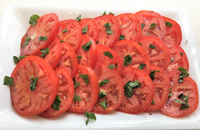Prairie Fare: Gardening Provides Exercise, Reduces Stress
(Click an image below to view a high-resolution image that can be downloaded)
“Can you move?” my husband asked with a smirk.
I glanced in his direction with narrowed eyes. He laughed.
“Barely,” I replied.
I moved slowly from the comfort of my easy chair to let our dogs outside.
I tried not to walk and sound like the “Tin Man” without an oil can. I was a bit stiff from the exertion of the past couple days.
I had just planted dozens and dozens (and dozens) of flowering plants, vegetables and seeds in our front and back yards.
My husband was in charge of mowing and trimming.
I enjoy communing with nature on pleasant early summer days. Besides enjoying fresh air and sunshine, I had acquired a week’s worth of lifting, bending and walking.
I probably should have stretched my muscles before hauling planters and bags of soil around our yard.
Gardening has health benefits on several levels. At the time, I had many projects with advancing deadlines, so I was feeling a bit stressed. Exercising my creative side by landscaping with various colors was calming.
Soon I was up to my wrists and ankles in soil. My deadlines did not seem very important.
In fact, researchers have noted that 30 minutes of gardening reduces the level of the stress hormone cortisol. I probably had no stress hormones in my body after eight hours of gardening.
Soil bacteria also positively stimulate your immune system. We all need strong immune systems.
If you do not garden, consider that having flowers around your home and workplace also reduces stress levels.
You may want to move your reading or writing tasks outside. Some researchers showed that attention span and memory can improve by 20%.
Gardening improves nutritional intake. Growing vegetables for adults or children makes it more likely that they will eat fruits and vegetables.
Other researchers have shown that gardeners have greater nutrition knowledge.
By the way, did you know that we adults should aim for 4 1/2 to 5 cups of fruits and vegetables (total) daily? Choose a rainbow of colors of vegetables to reap the benefits of beneficial phytochemicals (plant chemicals) on your health.
All that bending, stretching and load-bearing exercise during gardening improves our muscle tone. Weight-bearing exercises can help prevent osteoporosis, especially when accompanied by a healthful diet with plenty of calcium, vitamin D and other nutrients.
Who was burning more calories in our yardwork pursuits?
My husband, who was trimming and mowing, won the calorie-burning contest. Mowing a lawn, on average, burns about 306 calories an hour. Trimming shrubs burns about 240 calories per hour. When I was digging in the garden and raking, I burned about 250 calories an hour.
Gardening can have a ripple effect. In neighborhoods that beautify with gardening, you might find a bit of good-natured competition. The entire neighborhood may suddenly be “spruced up” to look better.
See www.ag.ndsu.edu/fieldtofork for links to webinars by our Extension experts, along with handouts and many other resources to help with growing, preparing and preserving produce.
Here’s a tasty, fragrant recipe from Sky Purdin, who shared this delicious recipe as part of our Growing Together Community Cookbook. It features ingredients that are easy to find in grocery stores and later, from farmers markets or our own backyard.
Fresh Tomatoes with Basil
3 tomatoes (any variety, but Roma or Beef tomatoes work very well)
3 tablespoons balsamic vinegar
½ cup fresh basil
Coarse sea salt (optional)
Rinse all produce thoroughly under running water. Slice the tomatoes into thick, round slices. Gently tear basil leaves and place on top of tomatoes. Drizzle with balsamic vinegar and sprinkle with sea salt (if desired).
Makes four servings. Each serving has 20 calories, 0 grams (g) fat, 1 g protein, 4 g carbohydrate, 1 g fiber and 5 milligrams sodium (without added salt).
(Julie Garden-Robinson, Ph.D., R.D., L.R.D., is a North Dakota State University Extension food and nutrition specialist and professor in the Department of Health, Nutrition and Exercise Sciences. Follow her on Twitter @jgardenrobinson)
NDSU Agriculture Communication – June 2, 2022
Source: Julie Garden-Robinson, 701-231-7187, julie.garden-robinson@ndsu.edu
Editor: Elizabeth Cronin, 701-231-5391, elizabeth.cronin@ndsu.edu




